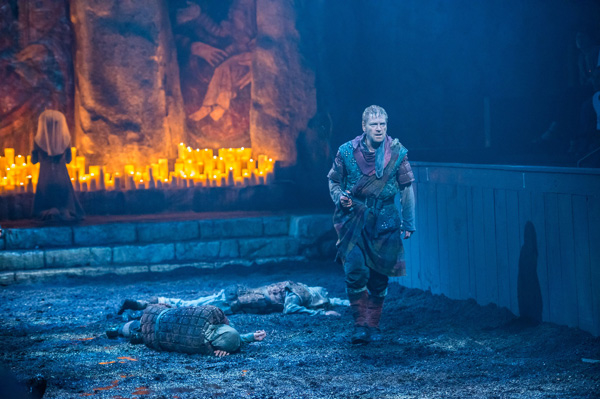
(© Stephanie Berger)
In this thrilling new revival of Macbeth, now receiving its U.S. premiere at the Park Avenue Armory, theatergoers are immediately divided into clans roughly based on the medieval Scottish thanedoms mentioned in William Shakespeare's "Scottish play". Glamis, Cawdor, MacDuff: They're all there. Are directors Kenneth Branagh (in his New York debut) and Tony winner Rob Ashford trying to tell us something about tribal loyalties and how they color our perspective on history? More likely, they're just trying to seat the audience of the massive drill hall in an efficient and simultaneously show-appropriate manner.
"Cawdor! No photography," boomed a hooded sentry as he ushered us through the massive wooden doors of the theater. This plea for supplication to the divine laws of intellectual property was the last time our clan honor was called upon. I can't say I was outraged when, early in the play, the Thane of Cawdor was exposed as a traitor. And although we were seated together, I didn't feel any special kinship with my fellow Cawdorites. This isn't the running-up-stairs and hiding-behind-walls immersive theater of Sleep No More, that other take on Macbeth playing across town. Still, with two hours of earth-shaking performances in a flawlessly designed space, this Macbeth needs no immersive element to take audiences right into the heart of the play.
Christopher Oram has designed a perfectly spooky setting for Macbeth. Once inside the theater, you're confronted with a dark-stone path lit only by the torches of the Druid-like figures that occupy this desolate place. Every other inch of the room is covered in mud and dirt, the occasional lonely stone marker or withered shrub dotting the landscape. The path leads into a Stonehenge-like Celtic meeting place. The stones at the far end of this traverse stage have medieval Christian paintings on them: Jesus and Mary are surrounded by a hundred tall candles, forming an altar. A massive cross hangs over the room. Much like the play itself, this place exists at the cusp of Paganism and Christianity, where the old traditions have been co-opted by the new faith.
Filled with dark magic and darker intentions, Macbeth is one of Shakespeare's most popular tragedies. It begins with an epic battle in the mud. Men die bloody deaths as rain pours from above (brutally staged by fight director Terry King). Macbeth (Branagh), Thane of Glamis, nobly defends King Duncan (John Shrapnel) from the Norwegian invaders. At the battle's end, Macbeth and his fellow thane, Banquo (Jimmy Yuill), come across three weird sisters (Charlie Cameron, Laura Elsworthy, and Anjana Vasan). These witches predict that Macbeth will become Thane of Cawdor and King hereafter. When the first prediction comes true, Macbeth and his wife (Alex Kingston) set about helping along the second by plotting to murder Duncan. Only after he has the crown, however, does the heirless Macbeth realize the folly of his ambition.
That 20/20 hindsight is a key element of this production. With every hastily constructed scheme and murder, Branagh's Macbeth proves the old cliché about the cover-up being far worse than the initial crime. "The very firstlings of my heart shall be / The firstlings of my hand," he says, choosing to double-down on impulse rather than step back and game things out.
A similarly brash and naive wife helps solidify this choice. As Lady Macbeth, Kingston matches Branagh at every moment. Their white-hot passion for each other is undeniable (and considering their childless state, a good explanation for why the marriage holds together). This Lady Macbeth is not the conniving Disney queen that is so often portrayed, but a woman blinded by the glitz and glamor of royalty. Like her husband, she discovers the costs far too late. They feed off each other's ill-planned ambition and unwavering trust.
Branagh and Ashford keep Macbeth lightning fast by allowing no space between scenes, and giving us little time to catch our breaths. Neil Austin's quasi-religious lighting and Christopher Shutt's cinematic sound design further accent important moments and usher the text forward. Earth, water, and fire appear onstage, invading our nostrils and making the stakes of the story frighteningly real. Many of the murders happen inches away from the audience. It's fitting that the seating in this 55,000-square-foot drill hall looks more like that of a medieval tournament than a posh Upper East Side theater.
This is an epic and lavishly imagined Macbeth into which Branagh and Ashford have succeeded in breathing fresh life and insight.









